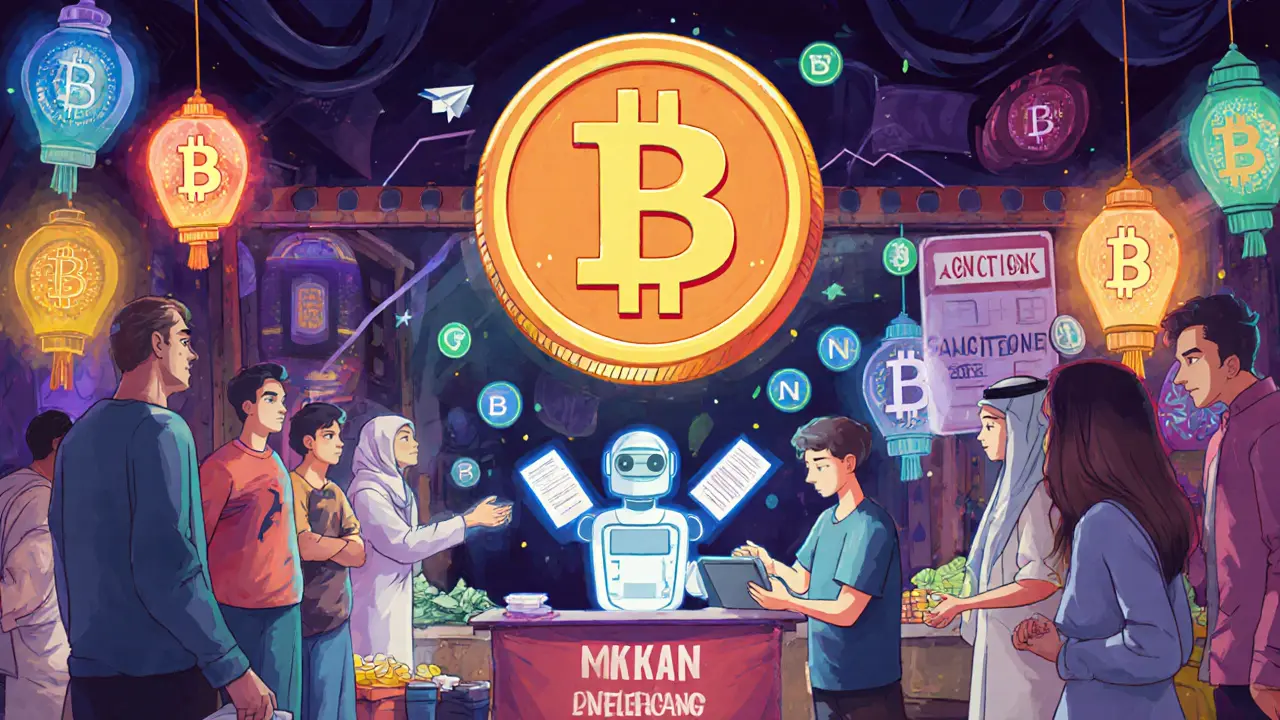Sanctioned Country Crypto Access Calculator
Daily Needs Calculator
Crypto Access Insights
Estimated Daily Stablecoin Needs: $0.00
Recommended Access Methods
When a country is under international sanctions, banks freeze accounts, wire transfers get blocked, and foreign currency becomes hard to find. For ordinary people in places like Iran, North Korea, or Russia, this isn’t just inconvenience-it’s survival. Food, medicine, and fuel prices spike. Jobs vanish. And yet, millions still find a way to send and receive money. The answer? Cryptocurrency.
Why crypto is the only lifeline left
Traditional banking systems are tightly controlled by governments and global financial networks. When sanctions hit, those systems shut down. But crypto? It doesn’t need a bank. It doesn’t need permission. It runs on code, not paperwork. That’s why, even when everything else is locked, people in sanctioned countries turn to Bitcoin, Ethereum, and stablecoins. Bitcoin makes up 65% of all crypto transactions tied to sanctioned entities. Ethereum follows at 18%. But the real workhorse? Stablecoins-especially USDT and DAI. These are digital coins pegged to the U.S. dollar. They don’t swing in value like Bitcoin. That makes them perfect for buying groceries, paying rent, or sending money to family abroad. In 2025, Tether froze 42 Iranian crypto addresses linked to Nobitex, one of Iran’s biggest exchanges. The move wiped out millions in USDT holdings overnight. But within days, users didn’t disappear. They moved. They swapped their frozen USDT for DAI on the Polygon network. Why Polygon? Because it’s fast, cheap, and harder for U.S. regulators to track. And DAI? It’s a decentralized stablecoin. No single company controls it. No one can freeze it with a single click.How they bypass exchange blocks
Most people think crypto exchanges are like banks-you sign up, verify your ID, and start trading. But in sanctioned countries, that’s impossible. No one’s going to let you upload a passport from Tehran or Moscow to a U.S.-based exchange like Coinbase or Binance. So how do they get in? They use offshore platforms. Some are legal. Some are not. Many operate from places like Dubai, Singapore, or the Seychelles-jurisdictions with lax oversight or no crypto taxes. Garantex, a Russian exchange, was shut down by U.S. and European authorities in March 2025. They seized $26 million and took down the website. But Garantex didn’t vanish. It moved. Its customers, funds, and tech were transferred to a new platform called Grinex. Same team. Same interface. Same users. Just a new name and a new domain. Then there’s MKAN Coin. It’s not even a website. It’s a Telegram bot. You message it. You send crypto. It sends you back local currency via peer-to-peer deals. No KYC. No ID. No questions. It’s run by people in Dubai who don’t answer to U.S. courts. And it’s growing. These aren’t fringe cases. They’re the new normal. When one exchange gets hit, another pops up. It’s like whack-a-mole-but the moles are smarter.
The role of mixers and DeFi
Mixers are tools that scramble the trail of your crypto. They take your coins, mix them with others’, and send you back clean ones. Tornado Cash was the most famous one-until the U.S. Treasury sanctioned it in 2022. But that didn’t stop people. In 2024, five new mixer services emerged, each more decentralized than the last. Then came DeFi. Decentralized Finance. No central company. No headquarters. Just smart contracts running on blockchains. In January 2025, OFAC made history by sanctioning its first DeFi protocol. They froze $150 million in assets. But the protocol kept running. Why? Because no one owns it. There’s no CEO to arrest. No office to raid. The code just keeps working. People in sanctioned countries use DeFi apps like Uniswap or Curve to swap tokens without ever touching a regulated exchange. They connect their wallet-MetaMask or Trust Wallet-to the app. They click. Done. No one asks for their name. No one asks where they live.How governments respond
The U.S. isn’t sitting still. OFAC, the Treasury’s sanctions arm, has added over 1,200 crypto wallet addresses to its Specially Designated Nationals list. In 2024, 23% of all new sanctions were crypto-related-up from 17% the year before. They’re working with INTERPOL and Europol to track cross-border flows. Fines for crypto firms that let sanctioned users in hit $430 million in 2024. But enforcement has limits. ShapeShift, a Swiss exchange, paid $750,000 in 2025 after it was found to have let users from Cuba, Iran, Sudan, and Syria trade freely-because it had no compliance system at all. That’s not rare. Many small exchanges don’t even know how to screen users. And even when they do, sophisticated users find ways around it. Iran didn’t wait for the U.S. to act. In August 2025, it passed a new law taxing crypto profits. Now, trading Bitcoin is treated like gambling or real estate speculation. The government wants to control it-not stop it. They’re trying to tax it, regulate it, and bring it into the state’s orbit. But that doesn’t stop people from using it. It just adds another layer of risk.

Adrian Bailey
November 10, 2025 AT 20:27man i just read this whole thing and honestly? it’s wild how tech just outpaces politics. like, sure, governments want to control money, but if you can send value across the world with a phone and a wifi signal, what’s the point of all these sanctions? i mean, i get it, they’re trying to punish regimes, but the people paying the price? they’re just trying to feed their kids. and crypto? it’s the only thing that doesn’t care if you’re from iran or russia. it just works. no paperwork, no bank fees, no ‘sorry sir your account is frozen’. it’s weird to think that the most democratic financial system right now is built on blockchain code. and honestly? it’s kinda beautiful. even if it’s messy.
also, i just learned about mkann coin via telegram. that’s insane. no id, no verification, just a bot. who even designed this? some hacker genius in a dubai apartment? i love it. and dais on polygon? yeah, that’s the real move. no one can shut that down with a single tweet.
also, tornado cash got sanctioned but five new ones popped up? that’s not a workaround, that’s evolution. we’re not fighting a system-we’re fighting a force of nature.
Rachel Everson
November 11, 2025 AT 10:07thank you for writing this. i’ve been reading about crypto in sanctioned countries for months and this is the first time someone actually explained it without sounding like a tech bro or a policy wonk. the part about stablecoins replacing local currencies? that’s not speculation-it’s happening right now. my cousin in iran uses dai to pay her rent. she swaps it through a local peer-to-peer group. no bank, no government, no middleman. just trust and code. it’s not perfect, but it’s survival. and honestly? if we’re going to keep using sanctions as a weapon, we have to accept that they’re not working the way we think. they’re just pushing people into more decentralized, harder-to-control systems. this isn’t a bug-it’s a feature of the internet age.
tom west
November 11, 2025 AT 10:25let’s be real. this isn’t about ‘survival.’ it’s about circumventing accountability. these aren’t ‘ordinary people’-they’re enablers. every usdt transfer from a sanctioned country funds a regime that tortures dissidents, bombs civilians, and steals from its own population. you call it ‘lifeline’? it’s a lifeline to tyranny. the fact that you’re praising decentralized finance like it’s some moral triumph is terrifying. no one owns a smart contract? great. so no one can be held responsible when it’s used to buy missiles or suppress protests. this isn’t freedom-it’s anarchy with a blockchain. and the west is sitting back like it’s a video game while the entire global financial architecture is being undermined by people who think ‘no KYC’ means ‘no consequences.’
you think the u.s. is losing? they’re just biding time. ai-driven chain analysis is already flagging 92% of suspicious wallets. the next wave of sanctions will freeze wallets based on behavioral patterns, not just addresses. you can’t outsmart math. and you can’t outsmart a government with a $20 billion budget for crypto surveillance.
Ashley Mona
November 11, 2025 AT 20:37omg i love how people are turning crypto into a secret society of resilience. like, imagine being in russia and sending your mom $50 in dai through a telegram bot while the government is watching your bank account like a hawk. that’s not just clever-that’s poetry. and the fact that dais on polygon are thriving? chef’s kiss. 🤌
also, i just found out about garantex turning into grinex. that’s like a superhero movie but real. the villains keep changing their capes but the heroes? they just keep swapping wallets. i’m so here for it. crypto isn’t money anymore-it’s rebellion with a private key.
Rebecca Saffle
November 12, 2025 AT 13:48you people are naive. this isn’t ‘people helping each other’-it’s criminals exploiting loopholes while you all cheer like it’s a tech demo. we’re talking about regimes that fund terrorism, suppress free speech, and murder their own citizens. and you’re celebrating how they bypass sanctions? congratulations, you’re helping dictators stay in power. the u.s. didn’t create these sanctions to be inconvenient-they were designed to force change. instead, you’re giving them digital weapons to keep their grip tighter. and now you’re smug about it? no. no. no. this isn’t innovation. it’s complicity.
Johanna Lesmayoux lamare
November 13, 2025 AT 22:30the fact that people are using crypto to buy medicine is the only thing that matters.
ty ty
November 15, 2025 AT 06:05so let me get this straight. you’re saying that because some guy in tehran can buy rice with bitcoin, we should stop trying to stop dictators? wow. that’s deep. next you’ll say we should let north korea trade nfts for nuclear warheads. genius. just let the world go full crypto-anarchy. sure, why not. nothing could go wrong. 🙄
BRYAN CHAGUA
November 17, 2025 AT 04:50i appreciate the depth of this analysis. it’s rare to see a piece that doesn’t reduce the issue to binary terms-either ‘crypto is evil’ or ‘crypto is freedom.’ the reality is more nuanced. sanctions are a blunt instrument. crypto is a scalpel. the problem isn’t that people are using crypto-it’s that we haven’t built a system that allows humanitarian exceptions without enabling abuse. the solution isn’t to shut down decentralized finance-it’s to build better compliance tools that distinguish between a mother sending money to her child and a regime laundering funds. the technology isn’t the enemy. the lack of thoughtful policy is.
dhirendra pratap singh
November 17, 2025 AT 18:50ok but let’s be real-this whole thing is a soap opera. 😭
first, u.s. sanctions freeze usdt. then iranians switch to dais on polygon. then garantex dies and comes back as grinex like a phoenix made of code. then someone builds a telegram bot that’s basically a crypto fairy godmother. and now the u.s. is spending millions chasing wallets like they’re playing hide and seek with a ghost. 🤡
the real villain? the u.s. government. they’re so obsessed with control they forgot people are human. you think a mother in tehran cares about your sanctions? she cares that her kid’s asthma inhaler costs 10x more. so she uses crypto. and you’re mad? 😭
and don’t even get me started on the fact that the u.s. sanctions tornado cash but then uses blockchain to track everything. hypocrites. the whole system is a circus. and we’re all just clowns with wallets.
Debraj Dutta
November 19, 2025 AT 04:37as someone from india, i’ve seen how digital finance can empower people without state backing. uPI in india didn’t need banks to reach millions-it just needed a phone and trust. crypto in sanctioned countries is the same. it’s not about rebellion. it’s about access. the real issue isn’t crypto-it’s that global systems are still built on 20th-century borders and 19th-century control models. we need new rules, not more sanctions. the technology is already here. it’s the institutions that are lagging.
Michael Jones
November 20, 2025 AT 08:07you guys are missing the point. the author didn’t write this to celebrate crypto. they wrote it to show that sanctions are failing. and if you’re still trying to enforce them the same way, you’re not protecting democracy-you’re protecting irrelevance. the real threat isn’t decentralized finance. it’s the illusion that control still works.